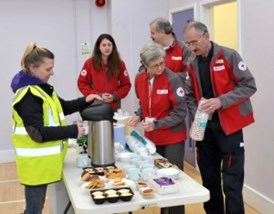Emergency Centres
Depending on the needs of those affected by an emergency, there are various types of emergency centres that can be established as part of the response effort.
Survivor Reception Centres - maybe set up near the site of the incident by the Police to provide a safe area for survivors not requiring acute medical treatment. A Survivor Reception Centre can offer first aid, immediate shelter and welfare and sign-post to further support. The Local Authority will organise welfare arrangements in the centre. The voluntary sector may support the Local Authority with the provision of welfare on behalf of the Police, including first aid. They may also be able to provide practical support to survivors such as refreshments, mobility aids or spare clothing.
Casualty Bureau – established by the Police as a single point of contact for receiving and collating all reported data through a public facing telephone line about casualties, suspected casualties and those believed to be missing as a result of the incident. Data is processed by a Police team to help trace and identify those individuals who may have been involved, reunite missing persons with relatives/friends and disseminate information to assist on going response activity.
Family & Friends Reception Centres – these centres are set up by the Police and supported by the Local Authority. They are a focal point for relatives and friends of those believed to be affected by the incident where they can go to seek information and practical and emotional support. Family and friends can also be provided/sign-posted to information about other support services available.
 Rest Centres – pre-designated locations (such as schools, halls, leisure or community centres) which are usually set up by the Local Authority and staffed by volunteers to provide a temporary, safe and warm place to stay until evacuees can return home. The Voluntary Sector and NHS services may also support the staffing of these centres. The centre provides basic facilities for sleeping, feeding, assistance with minor injuries and other welfare needs. Transport to and from a rest centre is often provided, including specialist transport and support for those who need it. Pets may be allowed in certain areas of a rest centre but owners should provide their own secure carriers or cages. If not arrangements will be made for them to be cared for. Read our advice about Preparing Your Pets.
Rest Centres – pre-designated locations (such as schools, halls, leisure or community centres) which are usually set up by the Local Authority and staffed by volunteers to provide a temporary, safe and warm place to stay until evacuees can return home. The Voluntary Sector and NHS services may also support the staffing of these centres. The centre provides basic facilities for sleeping, feeding, assistance with minor injuries and other welfare needs. Transport to and from a rest centre is often provided, including specialist transport and support for those who need it. Pets may be allowed in certain areas of a rest centre but owners should provide their own secure carriers or cages. If not arrangements will be made for them to be cared for. Read our advice about Preparing Your Pets.
Human Aspects Centres – intended to function as a ‘one stop shop’ facility where those affected by an emergency can access a range of support. It is managed and staffed by the Local Authority supported by many other organisations brought in to service the needs of those affected by the incident. Services within will adapt and change according to requirements.
Technical Support - Online Support Sites (Virtual Human Aspects Centres) – are websites, which can include social media, that provide a single place to access information and support for those affected by an emergency. They act as an online ‘one-stop-shop’ where affected individuals can speak to one another and access emotional and practical support e.g. through other agencies. Support sites may be established soon after an incident has occurred by one of the responder organisations, for example the Local Authority or a voluntary sector organisation. However, those affected may also set up their own support site/s.
